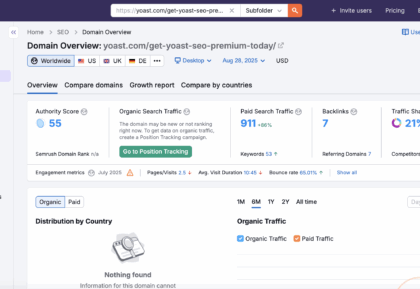The Role of an ERP Software Development Company in Streamlining Business Operations
In today’s fast-paced business environment, efficiency and accuracy are key to success. Enterprise Resource Planning (ERP) software plays a crucial role in helping companies streamline their operations, improve productivity, and make informed decisions. An ERP software development company plays a vital role in customising and implementing ERP solutions tailored to the specific needs of businesses.
Understanding ERP Software
ERP software integrates various functions within an organisation, such as finance, human resources, supply chain management, and customer relationship management, into a single system. This integration allows for real-time data sharing and collaboration across departments, leading to improved communication and decision-making.
The Role of an ERP Software Development Company
An ERP software development company specialises in creating customised ERP solutions that align with the unique requirements of each business. These companies work closely with clients to understand their processes, challenges, and goals before designing and implementing an ERP system that addresses specific needs.
Key responsibilities of an ERP software development company include:
- Analysing business processes to identify areas for improvement
- Customising ERP modules to meet specific business requirements
- Integrating the ERP system with existing software applications
- Providing training and support for employees during implementation
- Offering ongoing maintenance and updates to ensure the smooth functioning of the ERP system
The Benefits of Working with an ERP Software Development Company
Collaborating with an experienced ERP software development company offers several benefits to businesses:
- Increased Efficiency: Customised ERP solutions streamline processes, reduce manual tasks, and improve overall efficiency.
- Better Decision-Making: Real-time data access enables informed decision-making based on accurate information.
- Scalability: Scalable ERP systems can grow with the business and adapt to changing needs over time.
- Enhanced Integration: Seamless integration of various functions leads to improved communication and collaboration across departments.
- Competitive Advantage: Leveraging advanced technology through customised ERP solutions can give businesses a competitive edge in the market.
In Conclusion
An ERP software development company plays a critical role in helping businesses leverage technology to enhance operational efficiency and drive growth. By partnering with a trusted provider of customised ERP solutions, organisations can optimise their processes, improve decision-making capabilities, and stay ahead in today’s dynamic business landscape.
8 Key Advantages of Partnering with an ERP Software Development Company
- Customised solutions tailored to specific business needs
- Improved efficiency through streamlined processes
- Enhanced decision-making with real-time data access
- Scalable systems that can grow with the business
- Seamless integration of various functions across departments
- Expertise in ERP modules and technologies
- Ongoing support and maintenance services provided
- Competitive advantage in the market through advanced technology
Challenges in Partnering with an ERP Software Development Company: Key Considerations
- High initial investment required for customised ERP solutions
- Complex implementation process that may disrupt existing workflows
- Need for extensive training of employees to use the new ERP system effectively
- Potential resistance from employees towards adopting new technology
- Customisation of ERP software can lead to longer development timelines
- Dependency on the ERP software development company for ongoing support and updates
- Risk of data security breaches or system vulnerabilities if not properly managed
Customised solutions tailored to specific business needs
One significant advantage of partnering with an ERP software development company is the provision of customised solutions tailored to specific business needs. By understanding the unique requirements and challenges of each organisation, these companies can design and implement ERP systems that align perfectly with the business processes. This level of customisation ensures that the software addresses specific pain points, enhances operational efficiency, and ultimately empowers businesses to achieve their goals more effectively.
Improved efficiency through streamlined processes
One significant benefit of partnering with an ERP software development company is the improved efficiency achieved through streamlined processes. By customising ERP solutions to align with the specific needs of a business, redundant tasks are eliminated, and workflows are optimised. This streamlining of processes not only saves time but also enhances productivity by allowing employees to focus on value-adding activities rather than manual, repetitive tasks. Overall, the improved efficiency brought about by an ERP system leads to cost savings, faster decision-making, and a more agile and competitive business environment.
Enhanced decision-making with real-time data access
One significant advantage of partnering with an ERP software development company is the enhanced decision-making facilitated by real-time data access. By implementing customised ERP solutions, businesses can access up-to-date information across various departments instantly. This real-time data availability enables stakeholders to make informed decisions promptly, leading to better strategic planning, improved operational efficiency, and a competitive edge in the market.
Scalable systems that can grow with the business
One significant advantage of partnering with an ERP software development company is the provision of scalable systems that can evolve alongside the business. These adaptable solutions have the flexibility to expand and accommodate the changing needs and complexities of a growing organisation. By implementing an ERP system that can scale with the business, companies can ensure seamless operations, improved efficiency, and sustained success without the need for frequent system replacements or major disruptions to workflows.
Seamless integration of various functions across departments
One significant advantage of partnering with an ERP software development company is the seamless integration of various functions across departments. By implementing a customised ERP system, businesses can break down silos and improve communication and collaboration between different parts of the organisation. This integration ensures that data flows smoothly between departments, leading to increased efficiency, better decision-making, and a more cohesive operational structure. Ultimately, the ability to integrate functions seamlessly enhances overall productivity and effectiveness within the company.
Expertise in ERP modules and technologies
An ERP software development company’s expertise in ERP modules and technologies is a significant advantage for businesses seeking to implement or enhance their ERP systems. With in-depth knowledge of various ERP modules and technologies, these companies can customise solutions to meet specific business requirements effectively. Their proficiency allows for seamless integration of different functions within an organisation, enabling efficient data sharing and streamlined processes. By leveraging their expertise in ERP modules and technologies, businesses can benefit from optimised operations, improved decision-making capabilities, and enhanced overall performance.
Ongoing support and maintenance services provided
One significant advantage of partnering with an ERP software development company is the provision of ongoing support and maintenance services. This ensures that businesses have access to continuous assistance and updates to keep their ERP system running smoothly and efficiently. With dedicated support teams in place, clients can address any issues that may arise promptly, receive timely software upgrades, and benefit from expert guidance to maximise the longevity and effectiveness of their ERP solution. The availability of ongoing support and maintenance services offers peace of mind to businesses, allowing them to focus on their core operations while knowing that their ERP system is well taken care of.
Competitive advantage in the market through advanced technology
By partnering with an ERP software development company, businesses can gain a significant competitive advantage in the market through the implementation of advanced technology. Customised ERP solutions enable companies to leverage cutting-edge tools and functionalities that enhance operational efficiency, improve data analysis capabilities, and streamline processes. This technological edge not only boosts productivity and performance but also positions businesses ahead of competitors by enabling them to adapt quickly to market changes, make informed decisions based on real-time data, and deliver superior products and services to customers.
High initial investment required for customised ERP solutions
One significant drawback of engaging with an ERP software development company is the high initial investment required for customised ERP solutions. Developing tailored ERP systems to meet specific business needs involves extensive research, analysis, design, and implementation processes, which can be costly. The upfront financial commitment for customisation may pose a challenge for some businesses, especially small and medium-sized enterprises with limited budgets. Despite the long-term benefits of a customised ERP solution, the substantial initial investment can be a deterrent for organisations seeking to improve their operational efficiency through bespoke software development.
Complex implementation process that may disrupt existing workflows
One significant drawback of partnering with an ERP software development company is the complex implementation process that has the potential to disrupt existing workflows within an organisation. The integration of a new ERP system often requires extensive planning, data migration, and employee training, which can lead to temporary inefficiencies and interruptions in day-to-day operations. This disruption may result in productivity losses and employee resistance to change, posing challenges for seamless transition and adaptation to the new system. Careful consideration and effective change management strategies are essential to mitigate these issues and ensure a smooth implementation process.
Need for extensive training of employees to use the new ERP system effectively
One significant challenge associated with implementing an ERP software system in a company is the need for extensive training of employees to effectively utilise the new system. Transitioning to a new ERP system often requires employees to learn new processes, interfaces, and functionalities, which can be time-consuming and disruptive to daily operations. Adequate training is essential to ensure that employees can fully leverage the capabilities of the ERP system and minimise errors or inefficiencies during the transition period. However, the need for comprehensive training can pose a con in terms of resource allocation, as it requires dedicated time and effort from both employees and the company to facilitate a smooth adoption of the new ERP software.
Potential resistance from employees towards adopting new technology
One significant challenge faced by ERP software development companies is the potential resistance from employees towards adopting new technology. Employees may be accustomed to existing processes and systems, leading to apprehension and reluctance when transitioning to an ERP solution. Resistance can stem from fear of change, concerns about job security, or a lack of understanding of the benefits that the new technology can bring. Overcoming this resistance requires effective communication, comprehensive training programmes, and ongoing support to help employees embrace the new ERP system and realise its potential in improving efficiency and productivity within the organisation.
Customisation of ERP software can lead to longer development timelines
One significant drawback of working with an ERP software development company is that the customisation of ERP software can often result in longer development timelines. Tailoring an ERP system to meet specific business requirements involves detailed analysis, design, development, and testing processes, which can extend the overall timeline of the project. This delay in implementation may impact the speed at which the business can benefit from the new system, potentially affecting operational efficiency and decision-making capabilities during the transition period. It is essential for businesses to carefully weigh the benefits of customisation against the potential trade-off of longer development timelines when considering an ERP solution.
Dependency on the ERP software development company for ongoing support and updates
One significant drawback of relying on an ERP software development company is the dependency it creates for ongoing support and updates. Businesses that utilise customised ERP solutions developed by external providers may find themselves reliant on the expertise and availability of the development company for maintenance, troubleshooting, and system updates. This dependency can lead to potential delays in addressing issues, implementing necessary changes, or adapting to evolving business requirements if the ERP software development company faces challenges or limitations in providing timely support and updates.
Risk of data security breaches or system vulnerabilities if not properly managed
One significant drawback of utilising an ERP software development company is the potential risk of data security breaches or system vulnerabilities if not adequately managed. Inadequate security measures or oversight in the development and implementation of ERP systems can expose sensitive business information to cyber threats, leading to potential data breaches, financial losses, and reputational damage. It is crucial for businesses to work closely with ERP software developers to prioritise robust security protocols and regularly update and monitor their systems to mitigate these risks effectively.





